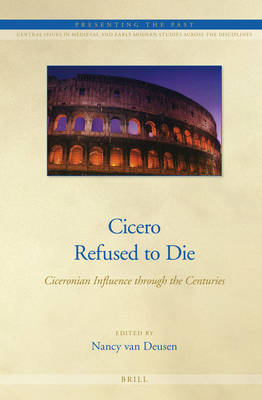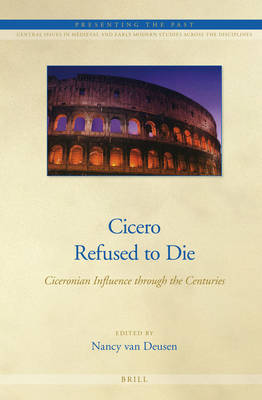
- Afhalen na 1 uur in een winkel met voorraad
- Gratis thuislevering in België vanaf € 30
- Ruim aanbod met 7 miljoen producten
- Afhalen na 1 uur in een winkel met voorraad
- Gratis thuislevering in België vanaf € 30
- Ruim aanbod met 7 miljoen producten
Zoeken
Cicero Refused to Die
Ciceronian Influence Through the Centuries
€ 228,95
+ 457 punten
Omschrijving
Cicero has indeed refused to die, despite the fact that he, in the year 43 BC, was savagely put to death, a preposterous event that brought an end to the long and illustrious career of a lawyer, politician, statesman, praetor, consul, and above all, intellectual, philosopher, writer. His works on The Ideal Orator, On Law, On Academic Life, On Supreme Good and Evil, The Nature of Gods, Foretelling the Future, Destiny, and Duties constituted the basis of a thorough study of Latin for many centuries of students. One might also, however, conclude that, with the virtual disappearance of Latin as a language that is commonly taught, Cicero might be seen to have suffered a second death; but this is by no means the case. This timely volume explores the many aspects of Ciceronian influence through the Middle Ages--and beyond--on education, literature, and legal training.
Contributors are Christopher S. Celenza, Frank Coulson, Nancy van Deusen, George L. Gorse, Michael Herren, Leonard Michael Koff, Valery Rees, Timothy A. Shonk, Terence Tunberg, and John O. Ward.
Contributors are Christopher S. Celenza, Frank Coulson, Nancy van Deusen, George L. Gorse, Michael Herren, Leonard Michael Koff, Valery Rees, Timothy A. Shonk, Terence Tunberg, and John O. Ward.
Specificaties
Betrokkenen
- Uitgeverij:
Inhoud
- Aantal bladzijden:
- 224
- Taal:
- Engels
- Reeks:
- Reeksnummer:
- nr. 4
Eigenschappen
- Productcode (EAN):
- 9789004243446
- Verschijningsdatum:
- 20/06/2013
- Uitvoering:
- Hardcover
- Formaat:
- Genaaid
- Afmetingen:
- 160 mm x 239 mm
- Gewicht:
- 476 g

Alleen bij Standaard Boekhandel
+ 457 punten op je klantenkaart van Standaard Boekhandel
Beoordelingen
We publiceren alleen reviews die voldoen aan de voorwaarden voor reviews. Bekijk onze voorwaarden voor reviews.










